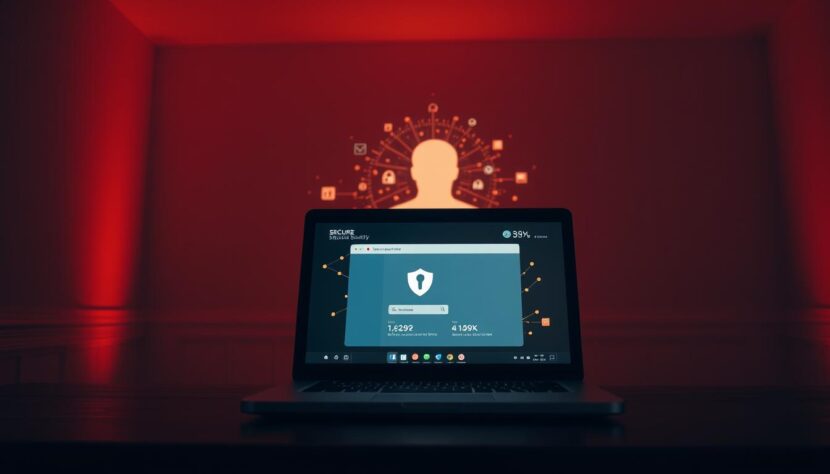Did you know over 80% of internet users have faced cybercrime? As we spend more time online, keeping our data safe is crucial. It’s vital to know how to protect our personal info in today’s digital world.
This article will give you tips to stay safe online. You’ll learn how to keep your privacy and security strong. Follow these steps to protect your online presence.
What is Secure Browsing?
Secure browsing is a way to keep your personal info safe online. It uses practices like HTTPS websites and privacy tools. These help keep your data from falling into the wrong hands.
It’s important because the internet is full of privacy threats. Without protection, your personal info can be stolen or used without your consent. Threats include spyware, phishing, and tracking cookies.
By using secure browsing, you can protect your online identity. It’s key in today’s world where our personal info is at risk more than ever.
Benefits of Secure Browsing
Secure browsing offers many advantages that make our online time better. One key benefit is better privacy protection. It helps keep personal info safe from hackers, which is crucial for keeping things private.
Secure browsing also means safer data. With more cybercrime happening, it’s important to protect our sensitive info. This not only keeps our personal data safe but also builds trust in the digital world.
Secure browsing also fights off cyber threats like identity theft and malware. By following safe browsing tips, we can enjoy the internet more. We can do so without worrying about online dangers.
https://www.youtube.com/watch?v=E3LVxDq-aBA
How to Implement Secure Browsing
To keep your online presence safe, you need to take proactive steps. Using secure browsing tools is a key strategy. These tools often include ad blockers, script blockers, and privacy-focused search engines.
Creating strong passwords is also crucial. Make sure each account has a unique password. A good password mixes letters, numbers, and special characters. Changing your passwords regularly adds an extra layer of protection.
Two-factor authentication is another important step. It requires a second verification method, like a code sent to your phone, to access your accounts. This simple step can greatly improve your online safety.
Finally, keep your software up to date. Updates for browsers and plugins often include security patches. Staying informed about these updates helps keep your security strong.
Choosing the Right Browser for Secure Browsing
Choosing a browser is key to secure browsing. Users need to pick wisely to protect their online privacy and security. Browsers like Brave and Tor are top choices for keeping user info safe.
Brave blocks ads and trackers by default, which helps prevent data misuse. It lets users control their online space. On the other hand, Tor uses a global network to keep users anonymous. This makes it hard for trackers to follow you.
When picking a browser, look at what matters to you. Compare features like ad blocking, data tracking prevention, and anonymity. Also, consider how easy the browser is to use.
| Browser | Ad Blocking | Data Tracking Prevention | Anonymous Browsing | User-Friendliness |
|---|---|---|---|---|
| Brave | Yes | Yes | No | High |
| Tor | No | Yes | Yes | Moderate |
| Firefox | Option | Yes | No | High |
| Chrome | No | Limited | No | High |
Looking at these features helps users choose better. Each browser has its own strengths. It’s important to know what you need before deciding.

Using HTTPS: A Key Component
HTTPS, short for Hypertext Transfer Protocol Secure, is key for online security. It encrypts data between users and websites, protecting against hackers. This makes browsing safer, especially when sharing personal info.
Users can check if a site is secure by looking for a padlock icon in the address bar. This icon means the site is encrypted. URLs starting with “https://” also show HTTPS is in use. Being aware of these signs helps avoid data risks.
| Feature | HTTP | HTTPS |
|---|---|---|
| Data Encryption | No encryption | Secure encryption |
| Connection Security | Vulnerable to attacks | Protected from attacks |
| User Trust | Low trust | High trust |
| SEO Benefits | Lower ranking | Higher ranking |
Choosing HTTPS-secured websites keeps personal info safe. It also makes the internet safer for everyone. Using secure sites is a big step towards better online safety.
VPNs: An Extra Layer of Security
A VPN, or virtual private network, is key for better online privacy. It creates a safe link between your device and the internet. This link encrypts your data, keeping it safe from hackers.
Using a VPN has big benefits for those who care about their online safety. It keeps your data safe, especially on public Wi-Fi. It also lets you access content blocked by your location.
Top VPNs like ExpressVPN, NordVPN, and CyberGhost meet different privacy needs. Look for speed, ease of use, and strong encryption when choosing. A VPN is a must-have for anyone serious about online security.

Avoiding Public Wi-Fi Risks
Public Wi-Fi networks are handy when you’re out and about. But, they can also put your security at risk. Public Wi-Fi risks like data theft and identity fraud can be serious.
Here are some key safe browsing tips to protect your data on public Wi-Fi:
- Avoid sensitive accounts and financial deals on public Wi-Fi.
- Use a Virtual Private Network (VPN) to encrypt your connection and hide your data from hackers.
- Only connect to secure, password-protected networks to lower your risk.
- Turn off your device’s network sharing when using public Wi-Fi.
- Update your software often to stay safe from new threats.
Knowing the dangers of public Wi-Fi helps you stay safe online. It’s all about being cautious and taking the right steps.
Browser Extensions for Secure Browsing
Browser extensions add important security features to your web browsing. They help block tracking, ads, and ensure your connection is safe. Tools like AdBlock Plus, Privacy Badger, and HTTPS Everywhere are popular for these reasons.
AdBlock Plus blocks ads, Privacy Badger stops trackers, and HTTPS Everywhere keeps your connection secure. Each tool offers unique benefits for your online safety.
Installing these extensions is easy. Just visit your browser’s store, search for the tool, and follow the installation prompts. This simple step boosts your security and makes browsing safer.
With the right extensions, you can browse the internet with confidence. You’ll know you’re protecting your privacy with proactive measures.

Understanding Cookie Management
Cookies play a key role in how websites collect and store user info. They remember preferences and login details, making browsing better. But, they also raise privacy concerns because of online tracking.
To stay safe online, users should keep an eye on their cookie settings. Clearing cookies often can stop many websites from tracking you. By adjusting these settings, you can block third-party cookies or only accept essential ones. This way, you get the needed functionality without losing privacy.
Controlling cookie management helps keep your browsing safe and gives you more control over your data. By setting up your own cookie policy, you can balance convenience with privacy. This makes your online experience better.
Ensuring Safe Online Shopping
Online shopping is convenient but comes with risks. It’s important to keep your online shopping safe. Look for secure payment gateways. They usually have HTTPS in their URLs and security certifications.
Also, think about using virtual credit cards. They add an extra layer of safety for online shopping. This way, you can shop without sharing your real card details. It helps prevent fraud and keeps your transactions safe.

| Feature | Traditional Credit Card | Virtual Credit Card |
|---|---|---|
| Card Number Exposure | Full exposure | No exposure |
| Transaction Limits | Set by bank | Customizable |
| Fraud Protection | Standard | Enhanced |
| Usage for Online Purchases | Full use | Limited to specific merchants |
To stay safe online, know about secure payment options. Use tools like virtual credit cards to protect yourself.
Social Media and Secure Browsing
Using social media can be fun but you need to be careful with your privacy. It’s important to check your privacy settings often. This helps keep your personal info safe.
Your online presence is shaped by what you post on social media. Every update you make is seen by others. To stay private, share less personal stuff. Here are some tips to keep your info safe:
- Regularly update privacy settings to control who can view your content.
- Be cautious when accepting friend requests or followers.
- Evaluate the information shared in posts to avoid exposing personal data.
By following these steps, you can enjoy social media safely. Taking care of your online presence makes browsing more secure.
Educating Yourself on Phishing Attacks
Phishing attacks are a big problem online. Cybercriminals use tricks to get people to share personal info. It’s key to know how to spot these scams to keep your email safe.
First, check the email address carefully. Look for small spelling mistakes that might mean it’s fake. Also, be wary of emails asking for personal info or saying you must act fast. These are signs of phishing.
To stay safe, don’t click on strange links. Try hovering over links to see where they go before clicking. Using strong security software can also help catch threats and protect you from phishing.
Regularly Monitoring Your Online Presence
Keeping an eye on your online presence is key to staying private and secure today. Knowing what info is out there about you helps you control your personal data. Tools like Google Alerts send alerts when your name or info pops up online. This way, you can keep track of your online image.
If you find out your data has been leaked, act fast. First, change passwords for any hacked accounts. Then, tell the right people and get help if you need it. Working with identity theft services can also add extra security to protect your data protection.
Staying Updated on Privacy Laws
It’s important for everyone online to know about privacy laws. Laws like GDPR and CCPA tell us about our rights to personal data. Knowing these laws helps us make smart choices when we’re online.
Companies that follow these rules show they care about our data. This trust makes our online time better. Learning about privacy laws helps us stand up for our rights and ask for clear data handling.
Keeping up with changes in these laws is key. Users need to know how services protect their data. Looking for reliable sources helps us stay informed and feel safe online.
Conclusion: Making Secure Browsing a Habit
Keeping your online activities safe is crucial in today’s digital world. It’s important to update your passwords often, use VPN services, and follow safe online practices. These steps help protect you from cyber threats.
Staying up-to-date with security news helps you spot new dangers. This way, you can keep your online space safe. Remember, making secure browsing a habit takes time and effort. It’s not just about one action; it’s about making it a part of your daily life.
By focusing on online safety, you help make the internet safer for everyone. Let’s all make secure browsing a regular part of our digital lives!


